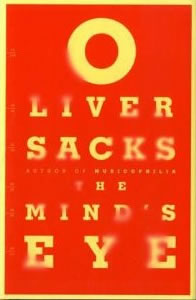Book Notes
 Oliver Sacks, The Mind's Eye (New York: Alfred A. Knopf, 2010), 263pp.
Oliver Sacks, The Mind's Eye (New York: Alfred A. Knopf, 2010), 263pp.
In his newest book, Oliver Sacks, Professor of Clinical Neurology and Psychiatry at Columbia University, explores how the brain processes vision, especially when it is faced with blindness, much as he explored how the brain processes music in Musicophilia (2008). As in his previous works, in much of the book Sacks relates dozens of "clinical anecdotes." For Sacks, his patients are not merely "cases," but rather fellow humans with fascinating stories to tell, and so these are informal, inherently fascinating, and deeply human case histories of his patients. In addition, he shares from letters that he has received, scientific studies, memoirs by blind people, the results of brain imaging techniques, and, in the longest chapter of the book, his personal journal that he kept when he suffered from ocular melanoma in his right eye.
Lilian has "alexia" or "visual agnosia." She can recognize the tiniest letters on an eye doctor's chart and can even write, but she can't read words or music (even though she's a famous pianist). Patricia lost the function of speech but maintained perfect intellectual abilities. Other people suffer from a blind spot in one quadrant of the brain, or from"object agnosia," in which although their visual acuity is normal, they can't recognize common objects, color, family faces, etc. Sacks describes his own struggles with "prosopagnosia" or "face-blindness" (the subject of his book The Man Who Mistook His Wife for a Hat), and with "topographical agnosia" or problems with identifying places (and so getting lost easily, even in a familiar place).
In addition to the many clinical case studies, Sacks weaves into his story the history of neuroscience and its study of how the brain processes vision. He describes the various coping mechanisms that people (and their brains) develop to compensate for the many types of "blindness." The good news, if there is any about blindness, is that the determination of patients and the dedication of therapists can result in remarkably resilient lives, despite great loss. Sacks exudes great empathy and curiosity, and he never belittles or pities his patients. Even in cases of "deep blindness," people develop a wide variety of ways to maintain a rich interior "visual" life, thanks to the plasticity of the human brain.


